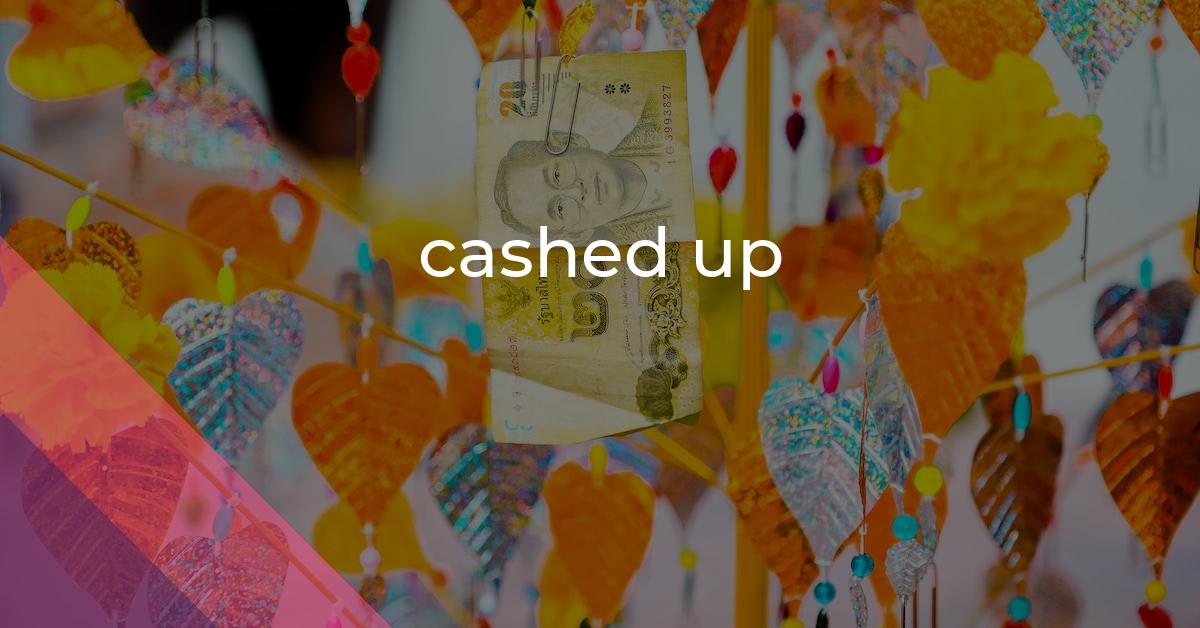cashed up: Idiom Meaning and Origin
What does ‘cashed up’ mean?
The idiom "cashed up" means to have a lot of money or to be financially well-off.

Idiom Explorer
The idiom "paid up" means that a person has fully paid for something, often referring to a membership or subscription fee. It indicates that all dues or financial obligations have been settled.
The idiom "in the money" means to be in a financially successful or prosperous situation.
The idiom *deep pockets* refers to someone who has substantial financial resources or is able to spend a lot of money. It suggests that the person is wealthy and able to make significant financial commitments or contributions.
"Cold hard cash" is an idiom that refers to physical money, typically in the form of coins or bills, that is immediately available and tangible. It implies the absence of credit, checks, or other non-monetary forms of payment.
The idiom "caught up" means to become deeply involved in or affected by something, often to the extent of being overwhelmed or consumed by it.
The idiom "cap it all off" means to finish or complete something in a remarkable or significant way, usually referring to the final act or event that adds significance or impact to the whole situation.
The idiom "bump up" means to increase or raise something, such as a price or a level, to a higher or more significant position. It is often used in a business or professional context.
The idiom "buff up" means to improve or enhance something, often through physical conditioning or increasing one's knowledge or skills.
Unveiling the Financial Significance
Cashed up is a popular idiom used in informal speech to describe someone or something that has a large amount of cash. It is often used in contexts related to business and finance. The idiom originated in Australia and New Zealand in the late 20th century and has since gained popularity.
One possible connection to the financial industry is the association of the word "cash" in the idiom. By combining "cash" with the word "up," the idiom creates a sense of abundance or surplus, emphasizing the idea of having a significant amount of money. Therefore, being cashed up means being financially well-off.
Cashed up is frequently used to describe individuals or businesses who have recently experienced a financial windfall or success, such as receiving a large bonus, winning the lottery, or closing a lucrative business deal. It implies a sense of financial freedom and the ability to make significant purchases or investments. In other words, being cashed up means being "in the money," having "big bucks," or being "paid up."
The popularity of the idiom cashed up has increased in recent years, and it is now commonly used in casual conversations and various forms of media. It has become a part of everyday language, particularly in English-speaking countries like Australia and New Zealand. The widespread usage of cashed up demonstrates its effectiveness in capturing and conveying the concept of financial wealth in a clear and relatable way.
While the primary meaning of cashed up denotes financial abundance, it has also acquired secondary connotations. In some situations, it can describe someone who is prepared and well-equipped with money to handle unexpected expenses or situations that require cash on hand. For example, a person who saves diligently and always carries cash may be referred to as "cashed up" in the sense that they are always ready to pay for unexpected expenses.
However, it is important to note that cashed up is highly colloquial and considered informal or slang. Its usage is more commonly found in spoken language rather than formal or academic writing. As with any idiom, the context and tone in which it is used play a significant role in determining its meaning and appropriateness.
Cashed up is a widely recognized idiom that originated in Australia and New Zealand. It signifies having a substantial amount of cash on hand and is often associated with financial success or opportunity. Despite its informal nature, the idiom has become ingrained in everyday language and serves as a concise way to express the concept of financial abundance. However, it is essential to consider the context and tone when using the idiom to ensure it is appropriate for the situation.
Example usage
Examples of how the idiom "cashed up" can be used in a sentence:
1. After winning the lottery, John was completely cashed up and ready to buy his dream house.
2. The wealthy businessman always travels with a large amount of cash, making him feel cashed up wherever he goes.
3. Sarah's job at the investment bank pays very well, so she is always cashed up and able to afford luxury vacations.
More "Finance" idioms



